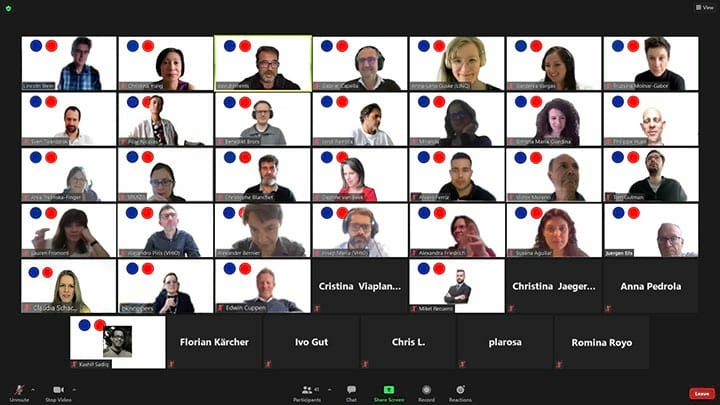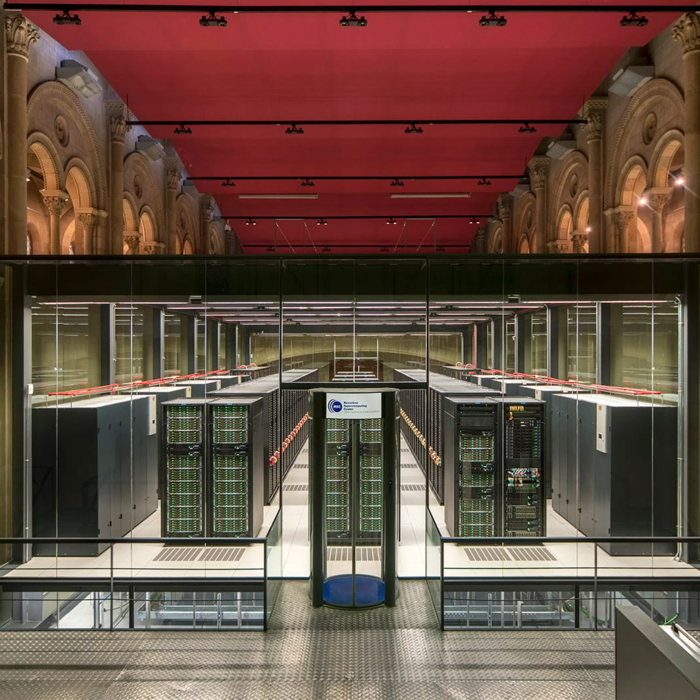The EUCANCan consortium got together virtually for a two-day annual meeting on May 20-21, 2021. The goal of the meeting was to take stock of the project’s progress to date and discuss upcoming milestones. Representatives of all EUCANCan’s 18 partners from Canada and Europe participated in the meeting, which was led by the Coordinator Dr David Torrents of Barcelona Supercomputing Center. LINQ manages EUCANCan’s WP7 Dissemination and Exploitation.
The first meeting day began with a review of the last project year and an outlook on the remaining project runtime. This introduction was followed by presentations by each Work Package Leader, who provided an overview of past achievements and upcoming activities in their respective work packages.
During 2020 and the first months of 2021, LINQ has emphasized strengthening EUCANCan’s ties with other research projects, both within and outside the EUCAN cluster, and continued to publish regular articles on the EUCANCan website to ensure that all significant project events are represented on the news page.
Meeting Day 1: External collaboration projects and the launch of the EUCANCan platform
Two themes stood in focus during the first meeting day, the forthcoming launch of the data portal, scheduled for the end of 2021, and EUCANCan’s collaborations with other research projects.
Technical progress
EUCANCan is well on track to reach the ambitious goal of building the first functioning pilot platform for genome data sharing between Canada and Europe before the end of the project in 2023. The cloud infrastructure needed to connect EUCANCan’s local nodes is currently in the final stage of development. When both the central and local technical infrastructure is in place, the next step will be to connect the local data centres.
Another topic discussed during the meeting is Onco Trials Track, a newly launched platform created in the context of EUCANCan. The platform aims to make it easier for healthcare workers to find suitable clinical trials to refer their patients to. Onco Trials Track has been developed by the team in WP5 Standardized Clinical Reporting Across Sites, led by VHIO.
Further, the consortium discussed a pipeline benchmarking process suggested by WP2 Genome Analysis Pipelines to Support the Therapeutic Cecision, led by Institut Curie. The WP2 team has developed guidelines for how pipelines in the workflow manager Nextflow can be implemented efficiently, using a “one container per tool” strategy. The EUCANCan GitHub repository includes information about bioinformatics pipelines capable of analyzing whole genome and whole exome sequencing data for tumors as well as golden datasets that can be used to benchmark pipelines.
External collaborations
The EUCAN cluster consists of EUCANCan and the five other projects funded under the same Horizon 2020 call, SC1-BHC-05-2018. There are two main cluster-wide working groups:
- the EUCAN Dissemination and Communication (D&C) Group, chaired by LINQ, and
- the EUCAN ELSI Collaboratory, where EUCANCan’s WP6 Ethico-Legal Framework for Clinical Oncology Data, led by McGill University, plays an active role.
LINQ is currently coordinating the effort to host a joint webinar between the EUCAN D&C group and the EUCAN ELSI Collaboratory, focused on how diverse stakeholders can be involved in international health data sharing, scheduled for this fall.
LINQ was also a driving force behind the initiative to launch the EUCAN D&C six-monthly newsletter in September last year. The first edition of the newsletter included a series of interviews with key EUCAN consortia members and a list of recent publications. The second EUCAN D&C newsletter was sent out in March 2021 and the third edition of the newsletter is scheduled to go live in September.
Further, LINQ has supported the EUCANCan in expanding its collaborations outside of the EUCAN cluster. In January, EUCANCan teamed up with ESPACE, managed by LINQ, to host a webinar titled “New IT approaches in genome analysis” and a one-day training focused on how to use cloud computing efficiently in biomedical research. LINQ organized the events together with the moderator Christian Lawerenz. We managed the advertising of the events, handled all communication with participants prior, during, and after the events, and set up the event registration page and the virtual meeting room.
Meeting Day 2: Guest speakers and a look into the future
During the second meeting day on May 21, the EUCANCan consortium welcomed a number of guest speakers from the European Commission, the Terry Fox Research Institute, ELIXIR, and BBMRI-ERIC.
The first speaker of the day was Jerome De Barros, who works as a Policy Officer focused on health innovation with the European Commission. He presented the European Health Data Space, a pilot project which aims to demonstrate the feasibility of cross-border analysis for healthcare improvement, regulation, and innovation.
Shari Dworkin, Chief Data Officer at The Terry Fox Research Institute, was the second speaker of the day. His presentation focused on innovation ecosystems at the intersection of healthcare and artificial intelligence.
Next out was Eivind Hovig, co-lead of the ELIXIR Cancer Data Focus Group. Eivind Hovig’s introduced the ELIXIR data management toolkit and provided a brief overview of how ELIXIR works together with GA4GH to develop standards for international data sharing.
The last speaker of the day was Petr Holub, IT and data protection manager at BBMRI-ERIC. Peter Holub’s presentation covered how BBMRI-ERIC works to ensure the findability of biobanking and biomolecular resources and improve access to biobanks through their efforts going into their Access Pipeline.
Appreciating that collaboration is an important component in research, the two-day annual meeting ended with an open discussion about different collaboration possibilities between the EUCANCan consortium and the guest speakers’ respective organizations.



